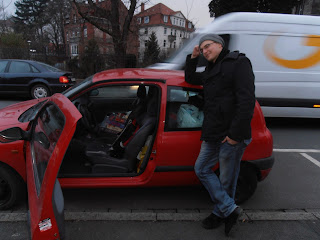Snowy Hamburg was replaced by rainy Mannheim. And they have trams here! And it looks generally much more like Brno. I have behind me the writing and listening modules of the exam, I will let you know the results after I get them.
 |
| Short stop at Göttingen |
 |
| View from my room in Mannheim |
 |
| Rhine River |
An example of what I am talking about: "auskommen" means "to get by". "aus" = "out", "kommen" = "to come". The verb "vyjít" in Czech means the same thing and also its structure is similar: "vy" = "out", "jít" = "to go". Although when constructing a new artificial language, I would never connect the meaning of "getting by with money" with "going out". However, this connection somehow works both in German and Czech.
I tried to make a list of these Czech/German expressions. Here it is:
- auskommen - vyjít s penězy (to get by)
- Das wird uns teuer stehen - To nás bude stát draho (That will cost us)
- durchfallen - přepadnout (to repeat a class)
- sich etwas vorstellen - představit si něco (to imagine something)
- Darauf kannst du Gift nehmen! - Na to můžeš vzít jed! (That's for sure!)
- jemandem einen Korb geben - dát někomu košem (to leave a boyfriend/girlfriend)
- bringen sich über etwas - přenést se přes něco (to put up with something)
- in einer Prüfung bestehen - obstát ve zkoušce (to pass the exam)
- schwerfällig - těžkopádný (cumbersome)
- durchsetzen - prosadit (to accomplish in the face of the unwillingness of the others)
- anwerfen - nahodit (to actuate)
- die Aufgeblasenheit - nafoukanost (pompousness, conceit)
- auf Achse (literally: "on the shoulders", the meaning "on the move" ) - there is a Czech expression "vzít nohy na ramena", literally "to take the feet on the shoulders", used in the meaning: "to run away"
- auffällig - nápadný (noticeable)
- erhalten - obdržet (to obtain)
- die Angelegenheit - záležitost (issue)
What interests me: Is the similarity of the expressions just a pure coincidence, or did one language get inspired from the other one? Czech has been for long centuries under the influence of German, so the second explanation sounds more plausible. However, if you have another one, I will be happy to hear it.
No comments:
Post a Comment